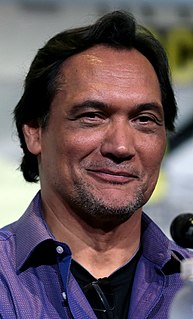Top 137 Payoff Quotes & Sayings - Page 3
Explore popular Payoff quotes.
Last updated on November 27, 2024.
[C]ultivated risk-taking represents an 'experiment with trust' (in the sense of basic trust) which consequently has implications for an individual's self-identity. (...) In cultivated risk-taking, the encounter with danger and its resolution are bound up in the same activity, whereas in other consequential settings the payoff of chosen strategies may not be seen for years afterwards.
Lately I've been falling asleep listening to 'Common One' by Van Morrison, specifically the song 'Summertime in England.' It's 15 minutes long, so to make it through the entire song is a real task unto itself, but Van has that emotional payoff that makes even his most tiresome songs more powerful than most people's entire catalog.
Try not to be concerned with it. It's a spiritual thing. Don't look for the results, don't live in the payoff. Live in the moment which is a spiritual principle. Live in the moment and let the results take care of themselves. It's in the hands of God. The rest is all ego. And I have learned, over the years, it's got nothing to do with me. As my life is none of my business.
People don't walk around thinking of themselves as bad people. You're part of the environment that you grow up in, and there can be decency in that. I always try to find a little glimmer of that, in anything that I do, because you can find places where there's humor or lightness in something that's deep and profound, and that tends to resonate more and make people more human. As an actor and performer, I think it resonates more with the audience when you do have the payoff.
I do think the challenge, in a way for me, is to write a narrative film and when you finish watching it you feel like it's a collage. You tell the narrative, you tell the story, but you feel like you've created this tapestry. But it also has a shape, a story. So I think there's a middle ground that I try to strike... away from where everyone else seems ready to go, which is, setup, payoff. You know, He's afraid of water, oh, and at the end he's swimming in water - oh, my God. I hate that stuff.
If you sat with a pencil and jotted down all the decisions you've taken in the past week, or, if you could, over your lifetime, you would realize that almost all of them have had asymmetric payoff, with one side carrying a larger consequence than the other. You decide principally based on fragility, not probability. Or to rephrase, You decide principally based on fragility, not so much on True/False.
Independent films will probably kill themselves off by virtue of their own success. With a crossover hit like PULP FICTION, the criteria by which art-house movies are produced and marketed and exploited have changed. With studio money and overheads and budgets and deal-making machinery, a certain kind of narrative structure and popcorn-type payoff start infusing themselves.
It was all for the eventual payoff and thank-you by giving Hillary Clinton the Democrat Party presidential nomination. And it went awry in 2008 because somebody they liked better came along. Somebody they really liked better. I mean, somebody they loved better. They threw her overboard like an unwanted sack of potatoes down on the farm for Barack Hussein Obama. And she seethed, felt betrayed. Don't blame her a bit. They betrayed her big time.
If the ad is bad people get turned off. That's 125 million potential viewers, so you just killed reach. But there's also a big potential payoff. I think it does pay off because you get a lot of traffic, a lot of free public relations(in media stories). It helps position themselves for the next round of financing.
If we can get to that 3 percent grow, it is $2 trillion to $2.5 trillion worth of more government revenues. It's 12 million additional jobs. And those are 12 million jobs paying into Medicare, 12 million jobs paying into Social Security. Growth really is what's driving all of this and growth is what our focus is, which is why we're willing to accept increased short-term deficits in exchange for that long-term payoff.
The best pay off in the world is when someone comes up to you and says, 'your music has helped me with some pretty rough times through life. I don't know if I would still be here if it was for your music whether it be country music or heavy metal has done for me.' That's ultimately the biggest payoff for me. I hear it from young kids to military guys and military women to older folks.
Investors should remember that their scorecard is not computed using Olympic-diving methods: Degree-of-difficulty doesn't count. If you are right about a business whose value is largely dependent on a single key factor that is both easy to understand and enduring, the payoff is the same as if you had correctly analyzed an investment alternative characterized by many constantly shifting and complex variables.
I'd love to write full time. But it's not something that is due to me because I'm a writer. Times are very hard for doing the thing you love, but the payoff for not having much money is that you love your job. A balance would be good. But yes, given infinite funds, or a guaranteed regular income of some kind, I'd happily shut myself away and write stories for the rest of what I've got in me.
The problem is that every study I'm aware of, which is probably not that many, has indicated that a dollar spent in preparation and avoidance of natural disasters is worth $15 that is spent in relief. But there's no political payoff for preparation. So, who benefits? I mean, the governor or senator or the president? Bill Clinton at Oklahoma City, his performance there helped him enormously. And there really hasn't been any regulation that would, in fact, interfere with environmental disaster.
Economic policies absorb almost the entire attention of government, and at the same time become ever more impotent. The simplest things, which only fifty years ago one could do without difficulty, cannot get done any more. The richer a society, the more impossible it become to do worthwhile things without immediate payoff.
What I’m talking about is more than recompense for past injustices—more than a handout, a payoff, hush money, or a reluctant bribe. What I’m talking about is a national reckoning that would lead to spiritual renewal. Reparations would mean the end of scarfing hot dogs on the Fourth of July while denying the facts of our heritage. Reparations would mean the end of yelling “patriotism” while waving a Confederate flag. Reparations would mean a revolution of the American consciousness, a reconciling of our self-image as the great democratizer with the facts of our history.















